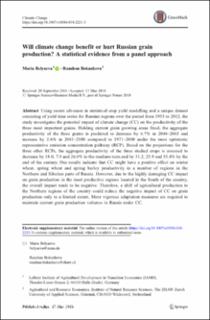Please use this identifier to cite or link to this item:
https://doi.org/10.21256/zhaw-3828| Publication type: | Article in scientific journal |
| Type of review: | Peer review (publication) |
| Title: | Will climate change benefit or hurt Russian grain production? A statistical evidence from a panel approach |
| Authors: | Belyaeva, Maria Bokusheva, Raushan |
| DOI: | 10.21256/zhaw-3828 10.1007/s10584-018-2221-3 |
| Published in: | Climatic Change |
| Volume(Issue): | 149 |
| Issue: | 2 |
| Issue Date: | 27-May-2018 |
| Publisher / Ed. Institution: | Springer |
| ISSN: | 0165-0009 1573-1480 |
| Other identifiers: | http://hdl.handle.net/10419/155773 |
| Language: | English |
| Subject (DDC): | 630: Agriculture |
| Abstract: | Using recent advances in statistical crop yield modelling and a unique dataset consisting of yield time series for Russian regions over the period from 1955 to 2012, the study investigates the potential impact of climate change (CC) on the productivity of the three most important grains. Holding current grain growing areas fixed, the aggregate productivity of the three grains is predicted to decrease by 6.7% in 2046–2065 and increase by 2.6% in 2081–2100 compared to 1971–2000 under the most optimistic representative emission concentration pathway (RCP). Based on the projections for the three other RCPs, the aggregate productivity of the three studied crops is assessed to decrease by 18.0, 7.9 and 26.0% in the medium term and by 31.2, 25.9 and 55.4% by the end of the century. Our results indicate that CC might have a positive effect on winter wheat, spring wheat and spring barley productivity in a number of regions in the Northern and Siberian parts of Russia. However, due to the highly damaging CC impact on grain production in the most productive regions located in the South of the country, the overall impact tends to be negative. Therefore, a shift of agricultural production to the Northern regions of the country could reduce the negative impact of CC on grain production only to a limited extent. More vigorous adaptation measures are required to maintain current grain production volumes in Russia under CC. |
| Further description: | Erworben im Rahmen der Schweizer Nationallizenzen (http://www.nationallizenzen.ch) |
| URI: | https://digitalcollection.zhaw.ch/handle/11475/7576 |
| Fulltext version: | Published version |
| License (according to publishing contract): | Licence according to publishing contract |
| Restricted until: | 2023-06-01 |
| Departement: | Life Sciences and Facility Management |
| Organisational Unit: | Institute of Natural Resource Sciences (IUNR) |
| Appears in collections: | Publikationen Life Sciences und Facility Management |
Files in This Item:
| File | Description | Size | Format | |
|---|---|---|---|---|
| Belyaeva-Bokusheva2018_Article_WillClimateChangeBenefitOrHurt.pdf | 1.67 MB | Adobe PDF |  View/Open |
Show full item record
Belyaeva, M., & Bokusheva, R. (2018). Will climate change benefit or hurt Russian grain production? A statistical evidence from a panel approach. Climatic Change, 149(2). https://doi.org/10.21256/zhaw-3828
Belyaeva, M. and Bokusheva, R. (2018) ‘Will climate change benefit or hurt Russian grain production? A statistical evidence from a panel approach’, Climatic Change, 149(2). Available at: https://doi.org/10.21256/zhaw-3828.
M. Belyaeva and R. Bokusheva, “Will climate change benefit or hurt Russian grain production? A statistical evidence from a panel approach,” Climatic Change, vol. 149, no. 2, May 2018, doi: 10.21256/zhaw-3828.
BELYAEVA, Maria und Raushan BOKUSHEVA, 2018. Will climate change benefit or hurt Russian grain production? A statistical evidence from a panel approach. Climatic Change. 27 Mai 2018. Bd. 149, Nr. 2. DOI 10.21256/zhaw-3828
Belyaeva, Maria, and Raushan Bokusheva. 2018. “Will Climate Change Benefit or Hurt Russian Grain Production? A Statistical Evidence from a Panel Approach.” Climatic Change 149 (2). https://doi.org/10.21256/zhaw-3828.
Belyaeva, Maria, and Raushan Bokusheva. “Will Climate Change Benefit or Hurt Russian Grain Production? A Statistical Evidence from a Panel Approach.” Climatic Change, vol. 149, no. 2, May 2018, https://doi.org/10.21256/zhaw-3828.
Items in DSpace are protected by copyright, with all rights reserved, unless otherwise indicated.